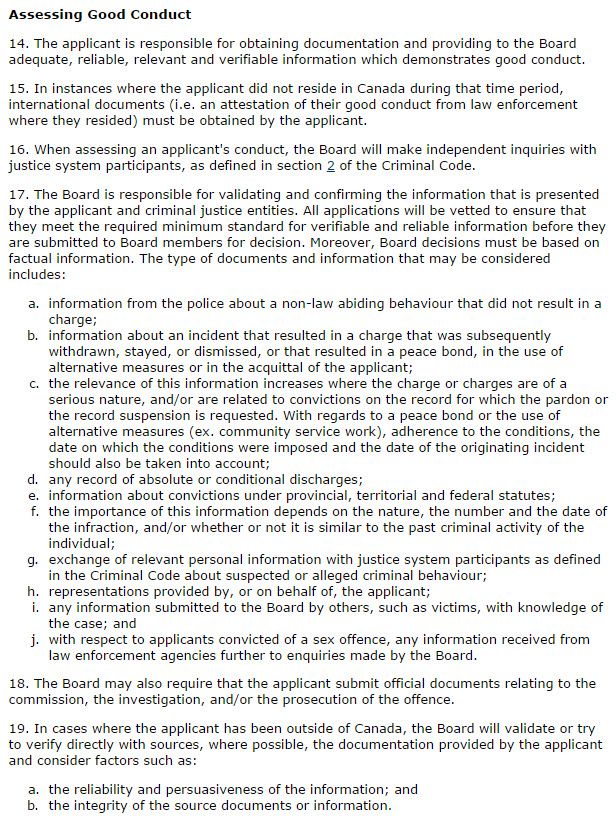Record Suspension (Pardon): Good Conduct Criteria
Criminal Records Act: What is Good Conduct Criteria?
The best way to understand what Good Conduct Criteria is start from the very beginning…with the Criminal Record Act. According to the Criminal Record Act, if you meet the good conduct criteria and are granted a Record Suspension, you can expect the following benefits:
Effect of a Record Suspension:
2.3 A record suspension
(a) is evidence of the fact that
(i) the Board, after making inquiries, was satisfied that the applicant was of good conduct, and
(ii) the conviction in respect of which the record suspension is ordered should no longer reflect adversely on the applicant’s character; and
(b) unless the record suspension is subsequently revoked or ceases to have effect, requires that the judicial record of the conviction be kept separate and apart from other criminal records and removes any disqualification or obligation to which the applicant is, by reason of the conviction, subject under any Act of Parliament — other than section 109, 110, 161, 259, 490.012, 490.019 or 490.02901 of the Criminal Code, subsection 147.1(1) or section 227.01 or 227.06 of the National Defence Act or section 36.1 of the International Transfer of Offenders Act.
Despite having a Record Suspension, you are not protected from all discrimination. But, that is an entirely separate topic. Please check out our Blogs on Discrimination. What this section of the Act reveals is that the Parole Board of Canada can deny an application if an applicant fails to meet the good conduct criteria. The Criminal Record Act is the piece of legislation or law that makes the granting of a Record Suspension possible. The term “good conduct criteria” is mentioned, but is not defined in the Criminal Records Act. An Act is a framework, which is further defined by Regulations and Policy Manuals. So we need to look at the Regulation and Policy Manual for the Criminal Records Act to try and figure out what the good conduct criteria are.
Criminal Record Regulations: Update to the Good Conduct Criteria
From time to time, Regulations are passed by an authority acting under the legislative framework known in this case as the Criminal Records Act. So we have an Act (the “law”) and what I refer to as “sub Act” or Regulations. In this particular case, the Regulations are simply an “update” to the Act which have not yet been merged with the Act. Eventually, the Act gets amended by having everything in the Regulations merged into it. This is a little different from Citizenship Immigration Canada’s Act and Regulations. In their case, the Act is “law” and the regulations are an “interpretation” to the entire Act. In our case (ie. for Pardon or Record Suspension Purposes), our Act is “law” and the Regulations are “in addition to” and are later merged with the Act.
As of the posting of this blog, there are no further updates as to the definition or interpretation of good conduct criteria in the Regulations. Everything to do with Good Conduct Criteria is at this time found only in the Act and Policy Manual (and of course, there is general information about it on the Parole Board Website). It is a good idea from time to time, to check into changes in the Regulations which might not appear in the Act or the Policy Manual (which is discussed below). What is a Policy Manual? Whereas in Immigration the Regulations interpret the Act, in this particular case, it is really the policy manual that interprets the Act.
PBC Policy Manual: Defining and Assessing Good Conduct Criteria
Good conduct is defined as “behavior that is consistent with and demonstrates a law-abiding lifestyle.” I’ve described below the standards or flexibility or freedom in which the Parole Board can use their own judgment in assessing good conduct. They can look at things like:
- any police involvement even if it did not result in charges or conviction;
- charges withdrawn, dismissed, stayed or resulting in a peace bond;
- seriousness of incident and whether it is related to similar convictions on the applicant’s criminal record;
- absolute or conditional discharges;
- convictions under provincial, territorial and federal statutes (ie. traffic offences or other non-pardonable offences);
- alleged criminal behavior and investigations;
- representations by the applicant (ie. the applicant could say something which can be construed negatively);
- representations by third parties (ie. I know of an instance where a victim once found out an applicant was applying for a pardon and reported additional negative information about the applicant); and
- information from other countries.
What does Good Conduct Criteria Have to do with OJ Simpson?
I always use this analogy when discussing the powers of the Parole Board of Canada. The question I often get is “How can the Parole Board of Canada refuse to grant me a Record Suspension for something that did NOT result in a criminal conviction?” Good question. My answer is this:
Criminal (“Beyond Reasonable Doubt”) Vs Civil (“Reasonable Belief)
From what I understand, a person has to be found guilty “beyond reasonable doubt” in criminal court to be convicted. But, on a civil level, there only has to be “reasonable belief” that a person was involved in criminal activity. The duty of the courts or ‘standard of care’ is much higher in criminal court than in civil court. For this reason, OJ Simpson was found “not guilty” in criminal court but found “guilty” in civil court. How does this apply to Record Suspensions? The Parole Board of Canada operates on a lower standard than Criminal Court. They operate on a similar level to civil court. This means, they only have to a reasonable belief that you were involved in criminal activity or associated with criminals in order to have the authority to deny your Record Suspension. To take it one step further, they can even deny your application based upon behavior not related to pardonable criminal convictions (ie. speeding offences).
Is there an abuse of Power by the Parole Board of Canada in assessing Good Conduct Criteria?
I do not necessarily want to get in their bad books…but I would say “yes”!!! Let me give you an example. If you came to me for a Record Suspension for a theft under, summary offence, committed 5 years ago, and there was no subsequent police intervention, I would state that it would be pretty easy to get you a Record Suspension. But if you had a similar conviction 10 years ago, and the incident 5 years ago resulted in a ‘withdrawn’, there could be a problem!!!! Even though it did NOT result in a conviction, the Parole Board could state you failed to meet the good conduct criteria since there was police intervention since your last conviction 10 years ago. I have learned the the Parole Board often imposes greater penalty to individuals NOT convicted than individuals who are convicted. Sometimes, my clients would have been better off being convicted. It is true that because the charge was withdrawn, the Parole Board of Canada has no way of knowing if the charge would have been summary or indictable had the individual been convicted. I would argue that if the charges was withdrawn, it should be considered less serious than either a summary or indictable offence. But, the Parole Board of Canada often operates with deaf ears.
The good conduct criteria is only a few years old. It seems to me that someone needs to challenge the Parole Board of Canada in the Supreme Court so that a limit can be place on their interpretation of ‘good conduct criteria’, meaning the Parole Board of Canada should NOT be permitted to impose a heavier penalty than what one would face if convicted of the lessor, being a summary offence.


